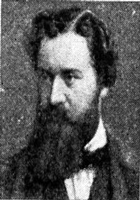Charles Stuart Calverley
Charles Stuart Calverley Poems
He stood, a worn-out City clerk --
Who'd toil'd, and seen no holiday,
For forty years from dawn to dark --
Alone beside Caermarthen Bay.
...
"Forever": 'tis a single word!
Our rude forefathers deemed it two:
Can you imagine so absurd
A view?
...
Farewell, farewell! Before our prow
Leaps in white foam the noisy channel,
A tourist's cap is on my brow,
My legs are cased in tourists' flannel:
...
1 Canst thou love me, lady?
2 I've not learn'd to woo:
3 Thou art on the shady
4 Side of sixty too.
...
Some vast amount of years ago,
Ere all my youth had vanished from me,
A boy it was my lot to know,
Whom his familiar friends called Tommy.
...
PART I
The auld wife sat at her ivied door,
(Butter and eggs and a pound of cheese)
...
In those old days which poets say were golden --
(Perhaps they laid the gilding on themselves:
And, if they did, I'm all the more beholden
To those brown dwellers in my dusty shelves,
...
I.
She stood at Greenwich, motionless amid
The ever-shifting crowd of passengers.
...
I KNOW not of what we ponder’d
Or made pretty pretence to talk,
As, her hand within mine, we wander’d
Tow’rd the pool by the lime-tree walk,
...
Often, when o'er tree and turret,
Eve a dying radiance flings,
By that ancient pile I linger
Known familiarly as 'King's.'
...
A is an Angel of blushing eighteen:
B is the Ball where the Angel was seen:
C is her Chaperone, who cheated at cards:
...
Thou, who when fears attack
Bidst them avaunt, and Black
Care, at the horseman's back
Perching, unseatest;
...
Now o'er the landscape crowd the deepening shades,
And the shut lily cradles not the bee;
The red deer couches in the forest glades,
...
I WATCH’D her as she stoop’d to pluck
A wild flower in her hair to twine;
And wish’d that it had been my luck
To call her mine;
...
I know not why my soul is rack'd:
Why I ne'er smile as was my wont:
I only know that, as a fact,
I don't.
...
In moss-prankt dells which the sunbeams flatter
(And heaven it knoweth what that may mean;
Meaning, however, is no great matter)
...
It was a railway passenger,
And he lept out jauntilie.
'Now up and bear, thou stout porter,
My two chattels to me.
...
The night-wind's shriek is pitiless and hollow,
The boding bat flits by on sullen wing,
And I sit desolate, like that 'one swallow'
...
Now the 'rosy morn appearing'
Floods with light the dazzled heaven;
And the schoolboy groans on hearing
That eternal clock strike seven:-
...
Charles Stuart Calverley Biography
Charles Stuart Calverley was an English poet and wit. He was the literary father of what has been called "the university school of humour". Early Life He was born at Martley, Worcestershire, and given the name Charles Stuart Blayds. In 1852, his father, the Rev. Henry Blayds, resumed the old family name of Calverley, which his grandfather had exchanged for Blayds in 1807. Charles went up to Balliol College, Oxford from Harrow School in 1850, and was soon known in Oxford as the most daring and high-spirited undergraduate of his time. He was a universal favourite, a delightful companion, a brilliant scholar and the playful enemy of all "dons." In 1851 he won the Chancellor's prize for Latin verse, but it is said that the entire exercise was written in an afternoon, when his friends had locked him into his rooms, refusing to let him out until he had finished what they were confident would prove the prize poem. A year later, to avoid the consequences of a college escapade (he had been expelled from Oxford), he too changed his name to Calverley and moved to Christ's College, Cambridge. Here he was again successful in Latin verse, the only undergraduate to have won the Chancellor's prize at both universities. In 1856 he took second place in the first class in the Classical Tripos. Later Life He was elected fellow of Christ's (1858), published Verses and Translations in 1862, and was called to the bar in 1865. Injuries sustained in a skating accident prevented him from following a professional career, and during the last years of his life he was an invalid. He died of Bright's disease. Works His Translations into English and Latin appeared in 1866; his Theocritus translated into English Verse in 1869; Fly Leaves in 1872; and Literary Remains in 1885. His Complete Works, with a biographical notice by Walter Joseph Sendall, a contemporary at Christ's and his brother-in-law, appeared in 1901.)
The Best Poem Of Charles Stuart Calverley
Peace. A Study
He stood, a worn-out City clerk —
Who'd toil'd, and seen no holiday,
For forty years from dawn to dark —
Alone beside Caermarthen Bay.
He felt the salt spray on his lips;
Heard children's voices on the sands;
Up the sun's path he saw the ships
Sail on and on to other lands;
And laugh'd aloud. Each sight and sound
To him was joy too deep for tears;
He sat him on the beach, and bound
A blue bandana round his ears
And thought how, posted near his door,
His own green door on Camden Hill,
Two bands at least, most likely more,
Were mingling at their own sweet will
Verdi with Vance. And at the thought
He laugh'd again, and softly drew
That Morning Herald that he'd bought
Forth from his breast, and read it through.
